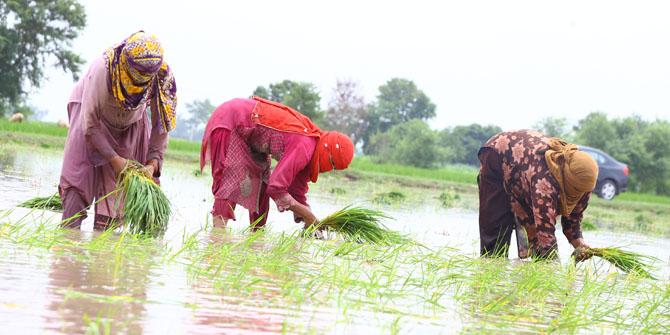The COVID-19 pandemic has affected every sector of the economy in Pakistan; the agriculture sector is no exception. However, proving its resilience in one of the country’s worst economic slowdowns, the agriculture and livestock sector fared far better than other services and small-scale manufacturing sectors. According to the Pakistan Economic Survey 2019-2020, COVID-19 had no significant impact on the agriculture sector, as it grew by 2.67 percent.
Agriculture is considered the backbone of Pakistan’s economy. It employs more than 36 percent of Pakistan’s labor force—of which more than 65 percent are women. A growth of 2.9 percent in important crops was observed due to an increase in the production of wheat, rice, and maize at 2.45 percent, 2.89 percent, and 6.01 percent, respectively. To support rice farmers during the pandemic, the Sindh Government has announced a subsidy of RS 1 billion each for the provision of pesticides, fertilizers, and quality rice seed to farmers with 25 acres of landholdings. A loan scheme is to be launched for smallholder rice growers who would get interest-free loans of RS 25,000.
Building farmers’ resilience
In addressing the adverse impacts of climate change, which are now exacerbated by COVID-19, the Gender Transformative and Responsible Agribusiness Investments in South East Asia (GRAISEA) project in Pakistan emphasized building the resilience of smallholder rice growers by establishing growers organizations (GOs) and introducing new farming techniques: laser land leveling, alternate wetting and drying (AWD) tubes, moisture meter to determine the time of harvest, fertigation techniques (i.e., providing irrigation with liquid fertilizers), and sustainable production practices and standards (i.e., the Sustainable Rice Platform).
To date, there are 25 GOs working with GRAISEA in Gujranwala and Sheikhupura, which are both in Punjab. Half of these GOs are led by women elected by their communities. The GOs aim to engage women farmers and labor in inclusive business with local rice exporters. As a result of the continuous social mobilization activities within these GOs, women are now actively participating in rice farming and additional activities to improve their livelihoods.
More than 800 women and men rice growers were engaged in 81 mobilization activities, where they were trained to use less production inputs for higher profits, as well as to improve the efficiency of their natural resources. Lessening growers’ reliance on input improves their resilience to climate change in the long term. Before GRAISEA, they were using outdated techniques that resulted in the overuse of farm inputs, as well as low quality and yield. GOs were likewise encouraged to document daily field activities in ‘farmer field record books’ that were designed and disseminated as part of GRAISEA.
Modern cultivation techniques
Qaisra Bibi is a farmer from Pul Shah Dula Village in Gujranwala. For years, she has been cultivating rice using traditional techniques in her 2 acres of land. Yet, her farm’s yeild was low (only 32 maunds per acre) against a high cost. When she brought her rice to the market, the middleman (Arthi) did not provide her a fair price. She was also not getting any extra income from her rice production. Because of this, she considered cultivating other crops instead of rice. However, according to Qaisra, she cannot abandon rice farming, as she does not have any other skill or source of income.
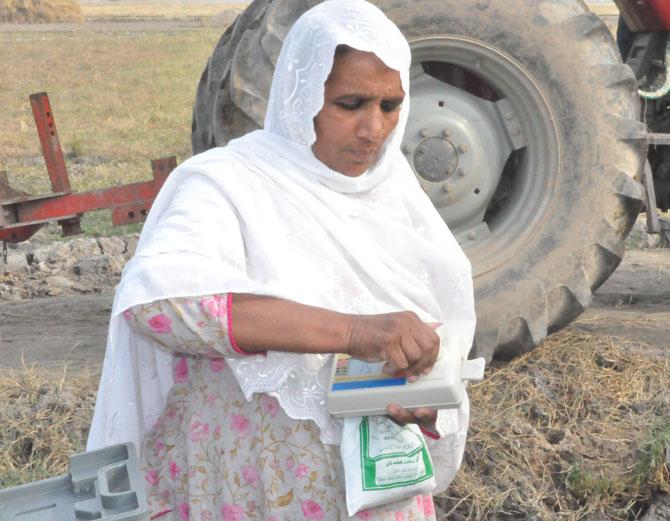
To support Qaisra and other farmers in Pul Shah Dula, GRAISEA organized a workshop led by the Rice Research Institute, where rice expert Dr. Tahir Awan delivered a session on rice production technology, such as laser land leveling and using a rice harvester (i.e., Kubota). During the training, Qaisra learned about modern rice cultivation techniques and the benefits of rice cultivation technology. She has also become a GO member.
“Before, I was harvesting crop using a combined harvester. Now I cultivate rice using laser land leveling, which is a magical resource-saving technique. My average yield is now 45-47 maunds per acre,” says Qaisra.
Private sector’s role in supporting farmers
Pakistan plays a major role worldwide as a rice exporter. It annually exports 2 million tons of rice, contributing 10 percent to the global trade in rice. Particularly in basmati rice, Pakistan’s share is around 25 percent in exports. With COVID-19 creating a restrictive environment in global agricultural trade, rice growers become directly affected, as negative impact is foreseen on agricultural imports, such as seeds, pesticides, fungicides, and special fertilizers, among others.
To help address this, GRAISEA facilitates continuous engagement between private sector companies and smallholder farmers. Discussions focused on how our private sector partners (i.e., MATCO, ATLAS, GALAXY, and RPL) and GOs can establish GO-led inclusive businesses. In these meetings, women and men farmers have voiced the need for the private sector to support them establish robust business models and improve their livelihoods. The private sector representatives committed to strengthen smallholder farmers’ businesses with different agriculture inputs to decrease their costs and increase their incomes.
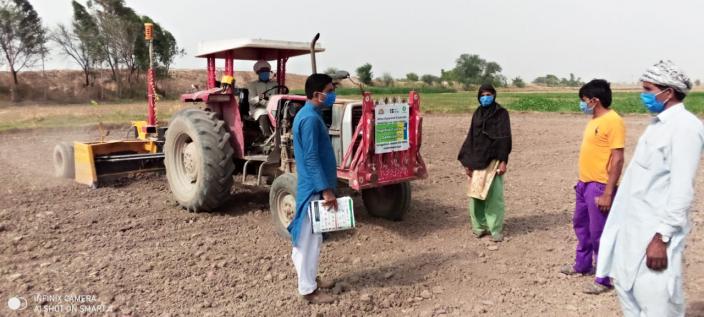
In the current sowing season, for instance, MATCO, GALAXY, and ATLAS supported farmers by providing seeds. A total of 180 women and men farmers reported a decrease in their cost per acre due to this seed provision. By using certified seeds, farmers can produce higher quality crops; they can also produce new seeds from basic certified seeds. This intervention is gradually changing the trend among farmers to get better yield using certified and good seed.
Strengthening women’s voice
Globally, women produce 50 percent of food and provide 43 percent of agricultural labor. In Asia, a family farming system—in which women’s roles are central as they supplement the family income by working in the fields—is common. However, the absence of social capital and well-integrated social community networks affects women’s ability to improve their livelihoods. These networks not only enhance access to loans but also help women bargain and sell their labor.
Take Rafia Bibi’s story as an example. Rafia is a rice farmer and the leader of the GO in Chak 27 in Muridke, Sheikhupura. In the beginning, Rafia’s GO did not have the knowledge and proper guidance to improve their economic standing in the community. This changed when she participated in a leadership training led by AGAHE, a GRAISEA partner. Now, Rafia participates in village meetings and represents her village in district stakeholder meetings. Motivated by being able to use her voice for the women in her community, Rafia also helps her GO members to improve their economic situation.
“I had a chance to participate in a multi-stakeholder platform held in Muridke, where different government departments and private sector representatives were participating. I highlighted the challenges and shared the effect of economic disparity on our village women, especially women laborers. Due to this economic disparity, they suffer and do not receive their fair share of wages for their work. Representing the women of my community increased my confidence, and I am motivated to help them improve their lives by representing them and by being their spokesperson in other multi-stakeholder meetings,” Rafia said.
Through a collective action, Rafia also sought the support of Nazia Mumtaz, Muridke’s Social Welfare Officer and head of Sanatzar, a government organization that helps villagers of Muridke gain employment. Rafia called a GO meeting to discuss the matter:
“It was decided that we will put our case collectively and file a request to start a sub-Sanatzar in our village, where we’ll engage women who can stitch and do embroidery. We wrote Nazia a letter and had a meeting in her office. She discussed the different aspects of the business with us, especially on engaging women with the needed skills. We collected data from these women and submitted it to Sanatzar along with embroidery samples. Now we are in the process of accessing this economic opportunity for our village women with the support of the government,” said Rafia.
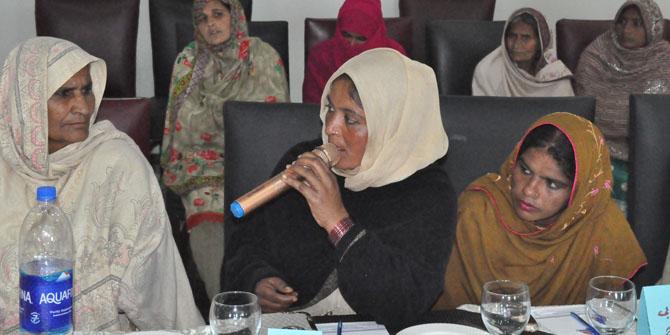
Moreover, as Pakistan navigates the COVID-19 pandemic, policy interventions that address the specific needs of women farmers are critical to mitigate the current economic fallout, accelerate the recovery process in rural areas, and alleviate existing gender inequalities.
Because smallholder farmers in both districts of Sheikhupura and Gujranwala are affected by the pandemic, GRAISEA distributed relief items and mobilized GOs to engage with the government initiative Benazir Income Support Program (BISP) for financial support to women farmers. BISP provides cash transfers to vulnerable and deserving women and their families from the poorest households across the country, irrespective of political affiliations, racial identity, geographic location, and religious beliefs. Oxfam’s partner mobilization team engaged extensively with all GOs and provided technical guidelines on applying for and availing the BISP program benefits.
Through continuous efforts, Oxfam and our partners succeeded in registering 640 GO members in this scheme. For Razia Bibi, a woman farmer from Mandheer: “My husband was the sole breadwinner of our family and was on daily wages. We could barely afford two meals a day. He has not been able to find work during the pandemic and our financial circumstances took a turn for the worst. After the training, I registered for the BISP program and I am grateful to receive RS 12,000, which has helped boost my family’s income.”
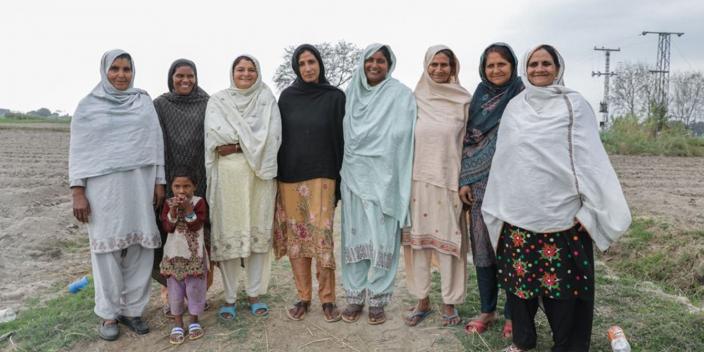
Farmers’ collective action against COVID-19
Relying on the government for agricultural import is not a sustainable solution to match the demands of a thriving agricultural sector. Focusing on indigenous agricultural support is a way to go, with consistent research and development, harmonized and well-managing local resources, and collective action.
Muhammad Iqbal Alwi, a farmer and a GO member in Kot Kirpa Ram in Gujranwala, has been engaged with GRAISEA since 2018, participating in numerous workshops held in their village. According to him: “My village farmers elected me as the president of the GO in my village. I volunteer my services to teach farmers and bring a change in their lives with the support of the GRAISEA project. Through different capacity building initiatives, I have learned about the new techniques of farming and have applied them to my field.”
“Due to COVID-19, everyone is facing challenges in their livelihoods or food security. We engaged with different stakeholders and try to get support for poor families. With the support of a local philanthropist, we were able to provide food to 40 families in our village and the nearby village of Kotli Paki. Although this was not a large contribution, we learned that if we take collective action, we can support people effectively. I am very happy to support small farmers and poor families during the pandemic,” said Muhammad.
An opportunity to reform the sector
Experts believe that COVID-19 can be an opportunity for Pakistan to reform its agriculture sector through more sustainable agricultural practices, job creation, youth participation, and women’s economic empowerment. We can start by locally producing tractors and other modern equipment, and by making them available at reasonable prices. Connecting Pakistan's farming industry with technology, manufacturing, engineering, and e-commerce can likewise offer a multitude of benefits, such as boosting economy, creating jobs, and improving lives. Pakistan’s government should play a leading role to ensure food security and control prices. Directly buying from smallholder farmers and pushing the middleman out of the equation would remove barriers and deter hoarding and corruption.
This story was written by the GRAISEA team in Pakistan, with support from the GRAISEA PMU. GRAISEA is a regional programme funded by the Embassy of Sweden in Bangkok to help improve the livelihoods of small-scale producers in the agriculture sector in Asia through inclusive value chains and responsible business practices. Photos by Oxfam in Pakistan and AGAHE
